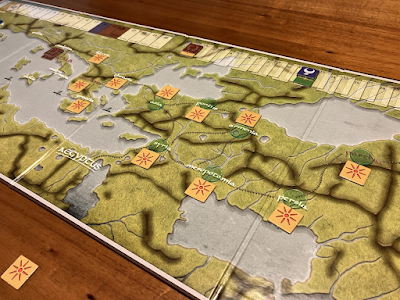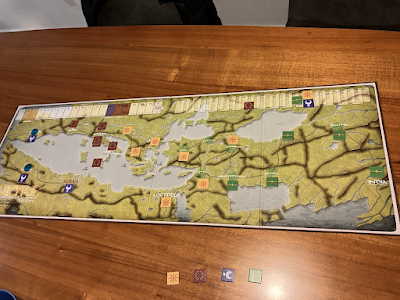Faced tonight with a sudden hankering to play a game, I trotted downstairs, surveyed the shelves, and settled upon Phil Sabin's Empire. As something that takes an epic subject, could be set up without too much rules review and can be got through in an hour, it was the obvious choice.
Covering the period 350-150 BC, the game takes in the Mediterranean world (stretching as far east as India) and its Persian, Macedonian, Carthaginian and Roman inhabitants. Each of the twenty game turns starts with a rebellion roll which turns one occupied territory neutral, and then the four powers get to take a turn attempting to expand. Usually a power gets one attack per turn, but in a great captain turn they will get five (so they best make the most of it).
There is not a lot to the game tactically: you are pretty much at the mercy of the dice. To successfully conquer a territory on Empire's point-to-point game map a power needs to roll 4 or better on a d6. There are modifiers at play, and with certain territories worth more for victory point purposes, it is usually clear what the best attack is, and then you have to hope the die (or dice when attacking across a sea route) will cooperate.
It's all very straightforward - even bearing in mind a couple of special rules - and with two victory turns (VPs are counted on turns ten and twenty), everyone knows what they are aiming at.
 |
| Opening situation: Carthage blue (3 territories), Rome red (1 territory), Macedon yellow (1 territory) Persia green (8 territories). |
In our game Macedonia started gloriously, winning Graecia on turn one and then watching Alexander wreak absolute havoc on turns two and three, wiping out the Persians and being on the doorsteps of both India and Aegyptus.
 |
| Alexander's conquests. |
Neither Carthage nor Rome could make much headway in the first century of play, but Persia / Parthia reclaimed its homeland just before the first victory turn was up, and with both Carthage and Persia receiving handicap assistance, the scores at 250 BC were recorded as Rome 5, Macedon 13, Persia 14 and Carthage 16.
Carthage and Rome squabbled over Gallia until Hannibal's entrance saw Rome's influence temporarily squashed. Two turns of great captains for Rome began promisingly, but perverse sea assault rolls and some untimely revolts meant Roman expansion was stopped at Sicily, Iberia and Macedonia.
All game Alexander's successors held on grimly to his conquests in Asia, but the Parthians (the Persian replacements) began to reclaim some of the eastern territories.
 |
| Parthians reconquer some of the ancestral homelands. |
Carthage and Rome continued to squabble ineffectually over Iberia, and at game end, the points were tallied thus: Rome 12, Persia / Parthia 20, and Carthage and Macedon tied for first place on 21.
 |
| Board at game end, 150BC. |
It was a nice little historical interlude, and left me with one or two ideas for future play.
